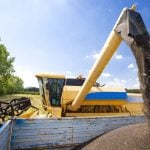Farmers who grow pulse crops know that ascocyta can be a serious problem. Break the cycle on your farm
Ascochyta blight is a seed-borne disease that can cause yield loss in peas, lentils and chickpeas. Fortunately, each strain of ascochyta is crop specific — the strain that infects your lentil crop will not impact your chickpeas. This makes crop rotation the first line of defence against ascochyta. “It’s important to start with a good […] Read more


